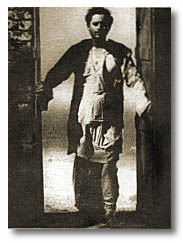Guru Dutt is remembered in the history of Indian cinema as the brooding intense romantic who attempted to reflect the changing social situation in India in the fifties. Within his short life, he created some of India’s most socially-conscious movies like Pyaasa (Thirsty, 1957), Kaagaz ke Phool (Paper Flowers, 1960) and Baazi (1951). He also introduced Waheeda Rehman in CID (1956) and propelled her to stardom through his films.
Born in Calcutta in 1925, Guru Dutt worked as a telephone operator before he embarked on his career as an actor and director in 1944. The fifties was the time when India, under Nehru’s brand of state socialism, was embarking on massive industrialization. The conventional wisdom has it that rapid changes introduced by industralization were undermining ‘traditional values’. What is certain is that industrialization, and the accompanying migration from rural to urban areas, was creating — as it still does in India — anomie, dislocation, and new social norms. In the urban environment, new social relations developed. It is, therefore, not surprising that a recurring theme in his films is the attraction, bound to be fatal, that develops between a middle class girl and a tough but likeable character from the lower class. His most memorable movie in this genre is probably Pyaasa. Inspired by Sarat Chandra’s novel, Srikanta, it depicts the romance between a poet and a prostitute. The genuine poet cannot survive amidst philistines and publishers interested only in profiteering: the spectre of the big city is everywhere in Guru Dutt’s films.
Guru Dutt’s films are also said to be marked by a certain nostalgia, most evident in Sahib, Bibi aur Gulam (Master, Mistress, and Servant), a film that explores the decline of feudal landed family. An aristocratic demeanor, a flair for style, characterize this film. Yet in all of his films, Guru Dutt was to show mastery over cinematic elements, from lighting and camera-work to film composition; and every films bears the unmistakable imprint of his work. Though not known widely outside India, Guru Dutt’s work compares with that of any director working at that time around the world. His brilliant career came to a premature end with his suicide, following a protracted struggle with alcoholism, in 1964.
Sources
Rajadhyaksha, Ashish; Willemen, Paul. Encyclopedia of Indian Cinema. London: British Film Institute; New Delhi: Oxford University Press, 1994
Mahmood, Hameeduddin. The Kaleidoscope of Indian Cinema. New Delhi: East West Press, 1974
Brief Filmography
Baazi (1951)
Pyaasa (1958)
Kaagaz Ke Phool (1959)
Sahib Bibi Aur Ghulam (1962)


